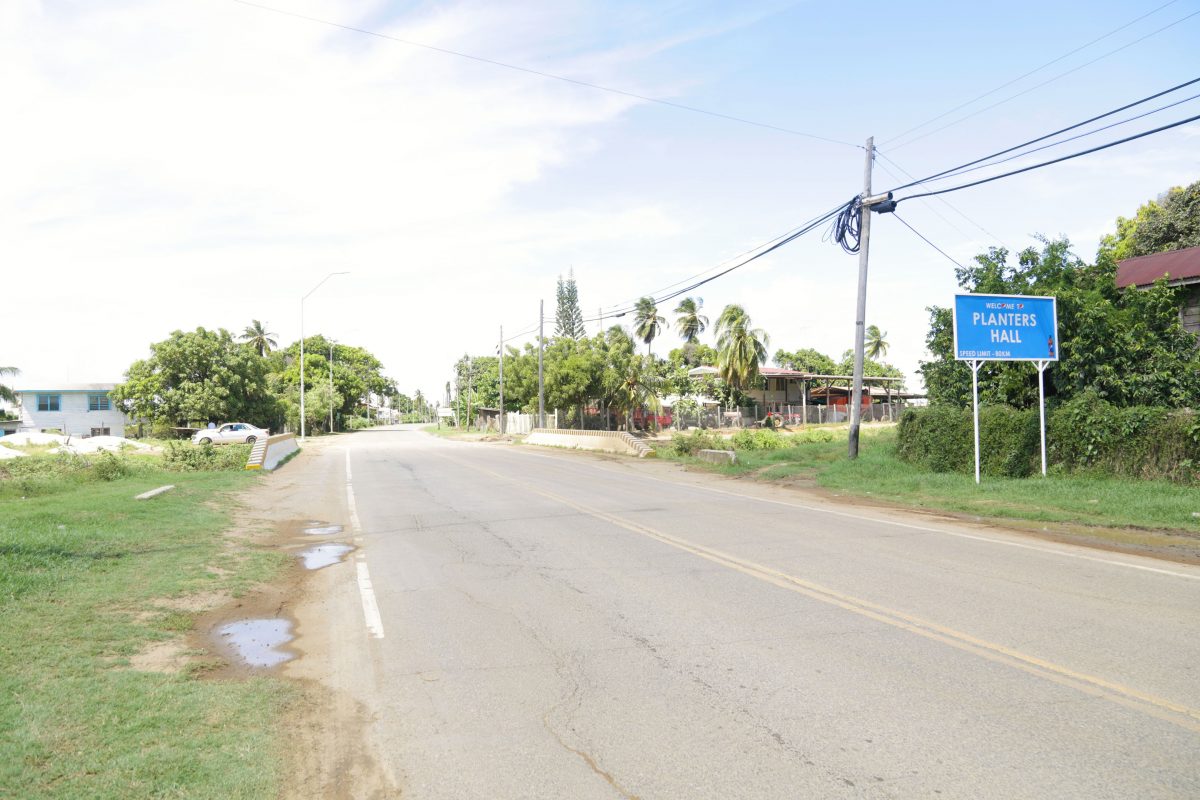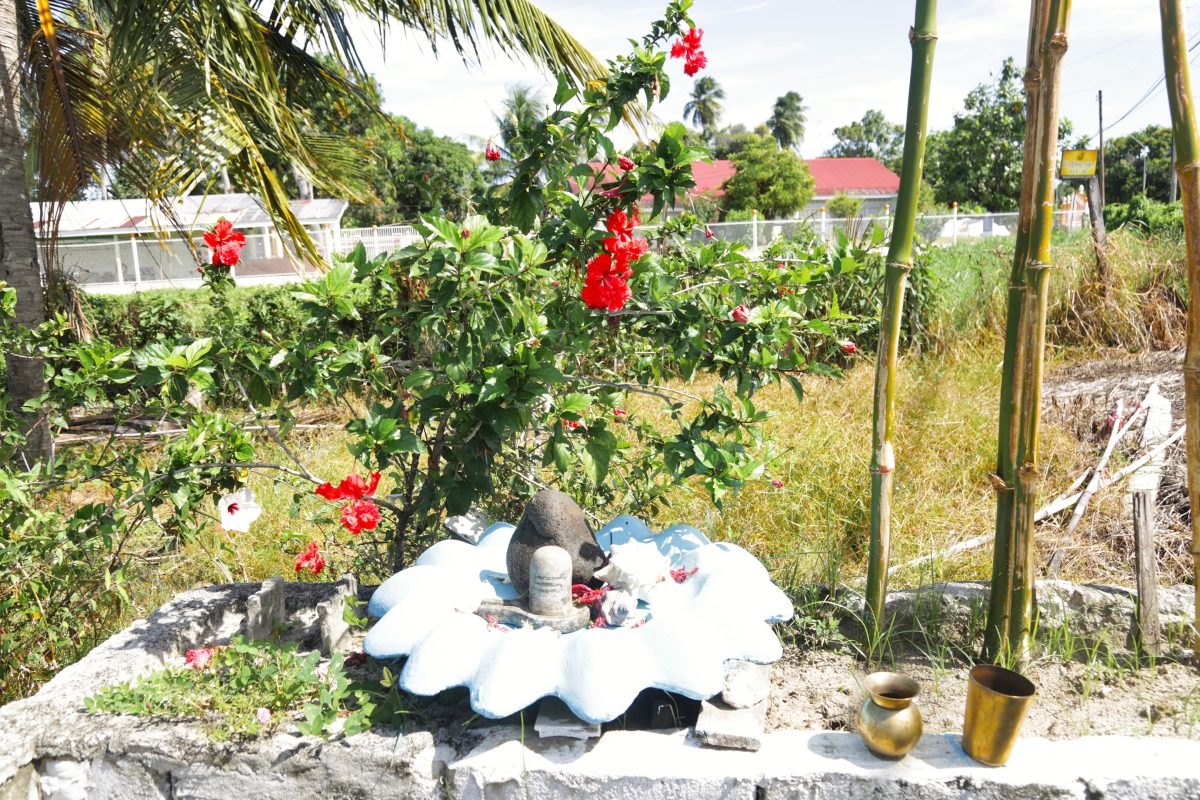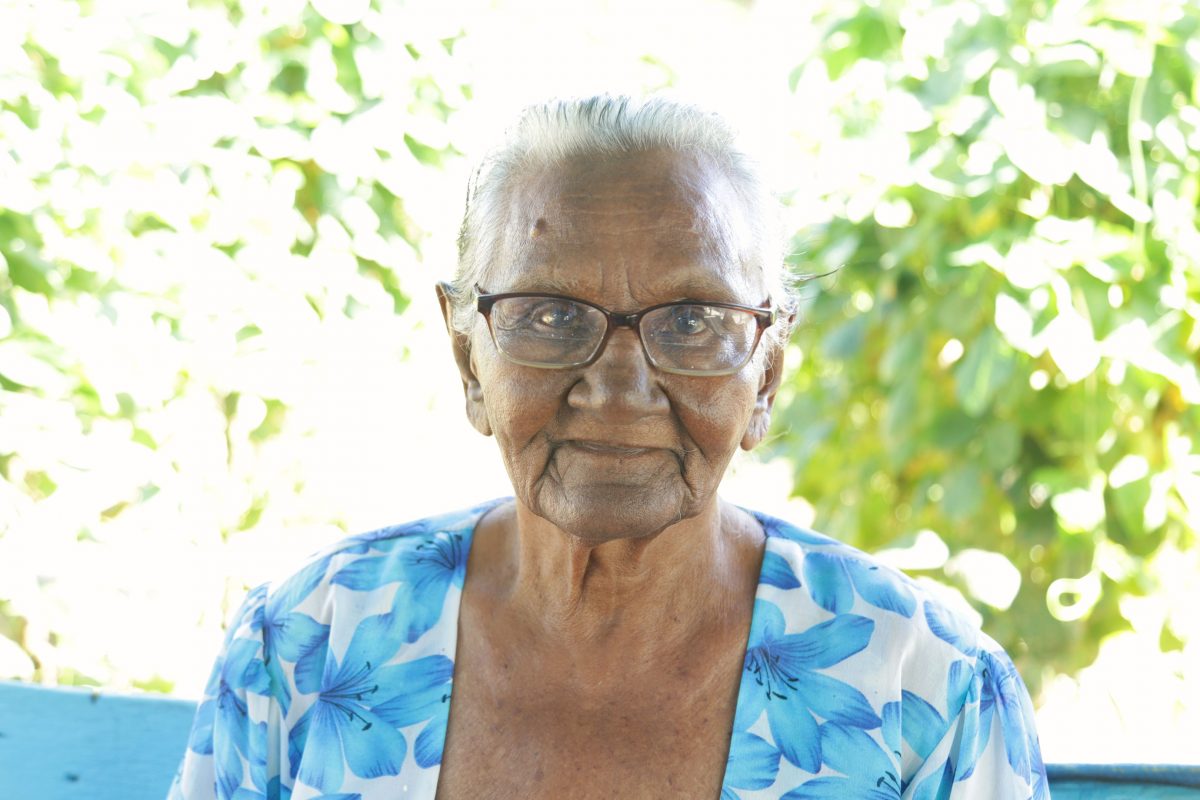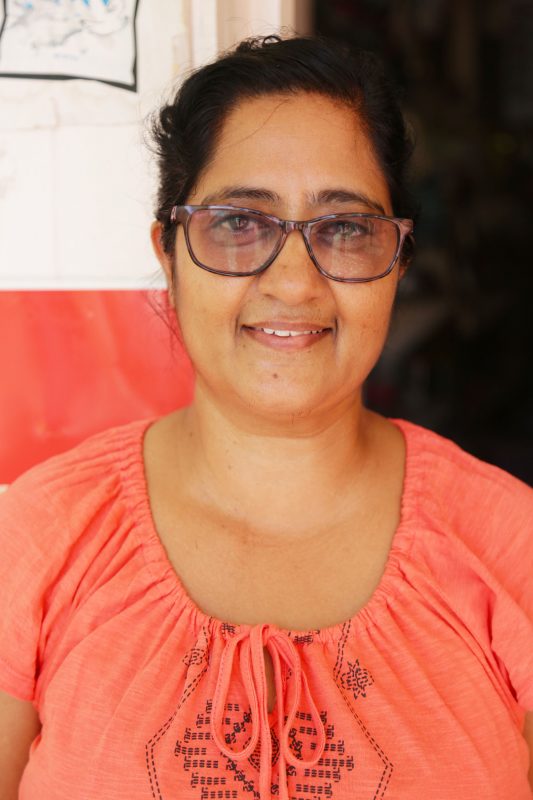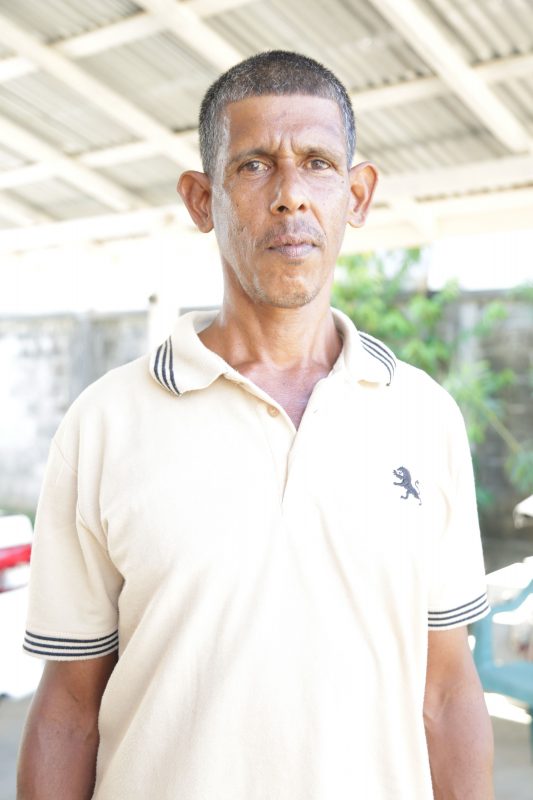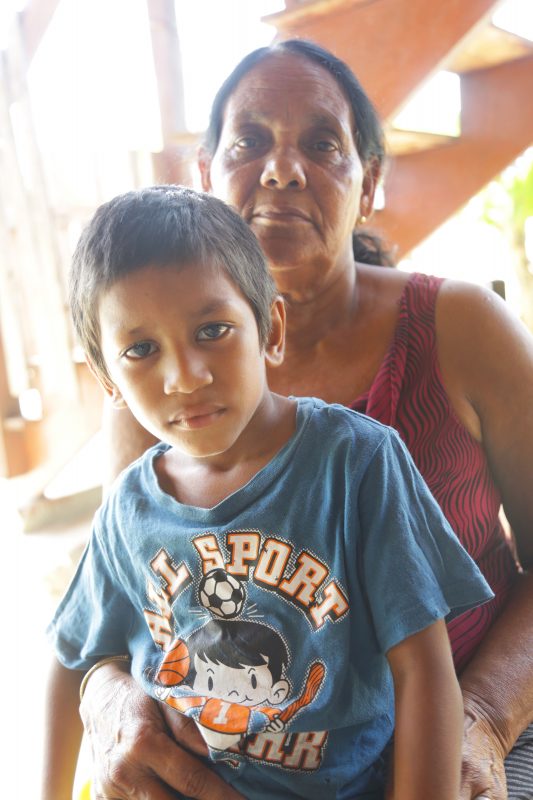Just over 31 miles from the city on the East Coast Demerara, and bordered by Zealand and Cottage, is a community called Planters Hall where the people live up to the name.
When I arrived at Planters Hall, the first thing I did was take a deep breath, which I had been wanting to do for a while but could not. That was because the villages leading to Planters Hall were smothered in the stench of stagnated sea water following a sea defence breach almost two months ago.
What I noticed was that plants of almost every kind, decorated yards and some parapets; just about everything was green and lush, unlike the yellowed grass seen in the villages leading to Planters Hall. Most of the village, except for one dam, escaped the floods.
Villagers depend on farming for their livelihoods. Many of them plant cash crops and a few grow rice. There are no schools, but schools are situated in the neighbouring villages. Planters Hall has a shop, a supermarket, a gas station and a church.
At one house Sheila Rampersaud was getting ready to pick up her grandson from nursery school. My arrival saw her sending another relative to get him and he arrived home two minutes later. She called him Ravi and said he was her baby; he called her granny, but she raised him from birth.
Rampersaud was born in Cottage and spent her early childhood in Belmont, before her family moved because of the 1964 riots. She remembered moving with her parents and siblings to Planters Hall, where they stayed at an aunt. Not long after things returned to normal and they could have moved back to Belmont, but the family decided to lease land in Planters Hall and stay.
After she got married, Rampersaud and her husband, who was from Wash Clothes, Mahaicony, and is now deceased, moved to the opposite side of Planters Hall, across from where she grew up.
She shared that Ravi, who lives with her, is the youngest of five grandchildren she takes care of; the eldest is 13. Two of the older children attend Mahaicony and Bygeval secondary schools, while two attend the primary school in Zealand and Ravi goes to nursery school in Cottage. Asked how it came about that she, a widower and pensioner, was left to raise five children, Rampersaud said that her late son, her only child, had lived with his family in Zealand and was visiting them on Old Year’s Day when he died. He had worked earlier in the day and had returned home when she heard his pregnant wife screaming that he fell and could not get up. She found him unconscious in a pool of blood. He died on New Year’s Day and to this day, his mother still does not know what caused his death.
After Ravi was born, his mother left to live elsewhere but she would return from time to time to check on the children.
“What you gon do? Ah trying here,” she said of making a life for herself and grandchildren. “I manage on welfare and the NIS I getting from when me husband used to work. On to now, many days ah does sit down and cry. I cry fuh me son more than ah cry fuh me husband. Them children does mek me remember he. The baby [Ravi] is the picture ah he….”
With the recent high tides that affected a number of villages in Mahaicony, Rampersaud’s sister, who lives at High Dam, some two miles away, was among those counting their losses. Her sister, she said, lost almost everything and is currently staying with her. While I was there, she had returned to High Dam to clean her home, but Rampersaud said there was not much that could be salvaged.
Asked about the future for the community, Rampersaud said she would like her grandchildren to have the opportunity of playing at a community centre ground. The closest one is situated almost two miles away at Fairfield. For the time being, they, like most of the children in Planters Hall, play their games in their yard.
Most of her shopping, the woman said, is done whenever she gets the opportunity to go to the Mahaica Market.
‘Miss Molly’
Molly Rambalack or ‘Miss Molly’ as she is well known, is a retired teacher and has for some years been keeping the lone shop in the village. Born in Dundee, Mahaicony, Rambalack remembers travelling to different villages and settling for short periods since her father, a headmaster, was always moving because of his job. She was eight years old when they moved to Planters Hall to live.
As a little girl, she attended Zealand Primary and then Bygeval Secondary School. Across the road from her is a gas station and supermarket and while they are her competitors, she noted that she has her own faithful customers.
Rambalack said that with the recent floods, she was not affected because of a canal that was dug for one of the private farms. She noted that as fast as the water was coming in, it was going back out through the canal. “One person own this entire area including the rice farm at the back here and the person responsible for the drain also, but now he died. His name was Mr Beni Persaud. Everybody here knew him as Pandit Alooball; they called him that because he had a big belly,” the woman said. However, while the village was not directly affected by the flood, residents have had to deal with the indirect effects, like the stagnant water breeding mosquitos.
It is so peaceful, Rambalack said, that residents can sleep at nights without fear of thieves. If one resident sees a strange car parked along the road in the village, he or she spreads the word; they make it their business to alert each other. She, too, wants a recreational facility built for the children and youth.
The oldest villager, at 85 years old, Bissoondularie Kissoon, better known as Auntie Florie, hails from Cane Grove. She was 18 years old when she moved to the community, escorted by her new husband. Their marriage, she shared, was arranged. Planters Hall then was brighter than Cane Grove. Although there were only three families living in the village at the time, the road was an all-weather one and vehicles ran along it all day. The three families were the Bridgegobins, the Ramrajs, and the Jadoos. None of the relatives of these families reside in the village today.
Kissoon’s husband worked with Transport and Harbours Department as a plate layer along the railway embankment. She was a housewife and raised their only child, a daughter, who today sells as a vendor in the Mahaica Market and supports Kissoon. She has no grandchildren but had adopted a boy; today he is a teenager and assists her in planting the vegetables around the yard.
Life here is all she can ask for, the woman said. She has the people who matter living with her, a thriving garden, amazing neighbours and God. Her daily routine begins with prayer early in the morning at her altar. Over at another house, Rakesh Persaud was chatting with his sister-in-law. He was originally from Planters Hall but has been living on the dam that separates this village and Zealand. He is one of the persons who was affected by the floods.
He is a labourer and with the rice crop over for now, he works sometimes once a month. However, he manages to stay afloat financially as a shepherd and whenever things are getting bad, he would sell a sheep; he has a little more than 30 at the moment.
“Is more than a month since the place flood, been since September time,” Persaud said. “Plenty ah me plants them dead out. Is mostly fruit trees meh had. Ah had soursop tree, young sucker trees, breadfruit trees, mango trees, all dead. Coconut tree, everything dead. Is only couple days now dem loose out the wata from the yard. Me had to move the sheep them from there and bring them ova here. I cyan carry dem back ova deh fuh a long time because nothing nah grow back for now. If grass do grow back, is nah grass fuh animal eat, is salt grass.”
After the flood, government officials along with persons from private entities had visited those affected and taken them hampers and cleaning agents. Since the breach, repairs to the sea dam are ongoing and so far, have prevented further flooding. It is only a matter now of water from affected areas being drained off.
“Abedese ah get the problem deh with the water and how it hold up plus people septic tank bin run ova. Them get [an excavator] deh that dem seh dem would ah use fuh lose back the wata but me nah see them come do nothing yet,” he added.
Recalling growing up in Planters Hall, the man said fun times were having bush cooks in the backdam and fishing for tilapia and other sweet water fish. But there was no place that he and the other boys then could use for playing games. While he wishes for a ground for the youth, he said also that all the land was privately owned, and he did not foresee anyone being generous enough to spare any.
Persaud also wishes for Zealand to be equipped with a bus shed for the primary school children as it can be dangerous when they are standing on the road awaiting transportation.
